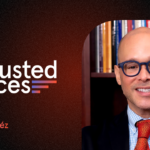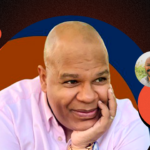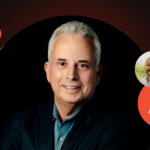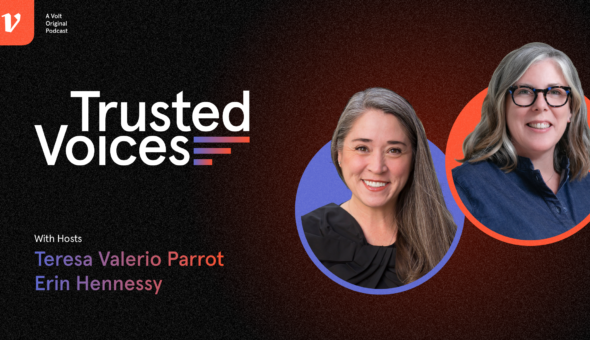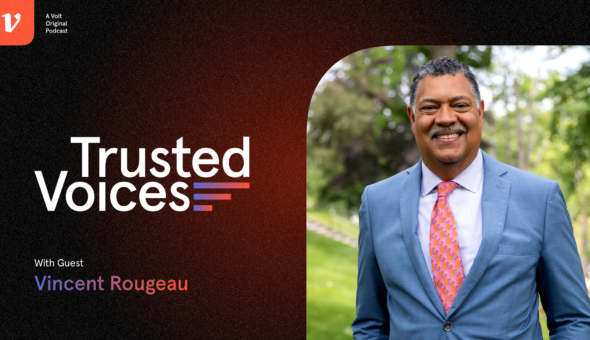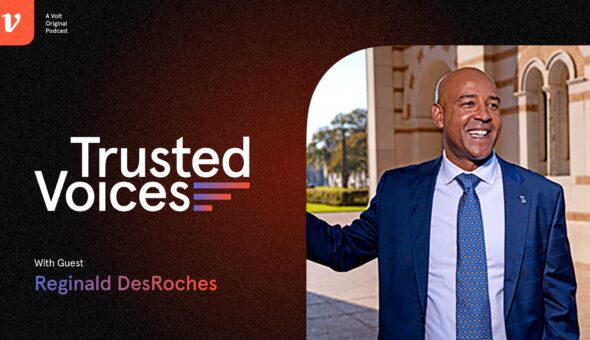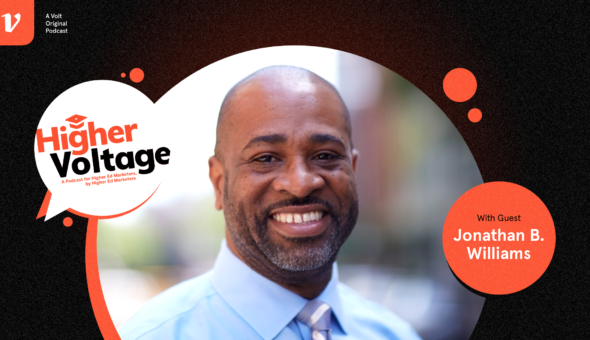Ad Read:
Higher Voltage is brought to you by eCity Interactive. For more than 20 years, eCity has created websites and digital marketing strategies and solutions for colleges and universities that deliver results and exceed expectations. Their latest offerings to higher ed clients include enrollment, funnel diagnostics and enrollment support services that efficiently attract and engage potential applicants, with results you have to see for yourself. To learn more, visit eCityinteractive.com.
Kevin Tyler:
Hello and welcome to Higher Voltage, a podcast about higher education that explores what’s working, what’s not, and what needs to change in higher ed marketing and administration. I’m your host, Kevin Tyler.
I cannot tell you how excited I am to have our next guest on Higher Voltage, the one and only Dr. Marcus Collins. Dr. Collins is an award-winning marketer and cultural translator. He is the former chief strategy officer at Wieden + Kennedy New York, a marketing professor at Ross School of Business at the University of Michigan and the author of the bestselling book “For the Culture: The Power Behind What We Buy, What We Do, and Who We Want to Be.” Dr. Collins is a recipient of Advertising Age’s 40 Under 40 award and an inductee into the American Advertising Federation’s Advertising Hall of Achievement. Most recently, he was recognized by Thinkers 50 and Deloitte among their class of 2023 Radar List of 30 thinkers with the ideas most likely to shape the future. His strategies and creative contributions have led to the launch and success of Google’s “Real Tone” technology, the “Made in America” music festival and the Brooklyn Nets, among others. Before his advertising tenure, Marcus worked on iTunes + Nike sport music initiatives at Apple, and ran digital strategy for Beyonce. Does everyone know who Beyonce is? Beyonce. Welcome to Higher Voltage. Marcus, thank you so much for being here today.
Marcus Collins:
Oh man, it’s a pleasure to be here. Thank you so much for having me.
Kevin Tyler:
So, there are lots of reasons why I’m excited to be talking to you today. One of those reasons is because you’re going to be one of the keynote speakers at the upcoming AMA higher ed conference, which I’m excited about in Chicago in November. Also, because you were one of our keynote speakers at a recent event I held at Simpsons Scarborough, my agency, for some CMOs, where you talked about your book but also about this idea of culture in higher education, marketing and recruiting. And which is an interesting topic for me. Okay, so early on in the book “For The Culture,” you write, “Culture is a realized meaning-making system.” I’m wondering if you can break that down and also include a high level of the system of systems that make up culture.
Marcus Collins:
Absolutely. So, culture is one of those words we often use but seldom fully understand. And oftentimes it’s because culture is just, it’s abstract, it’s nebulous, it’s esoteric, but it’s also omnipresent and it’s in everything. So trying to define something that seems so overwhelmingly present becomes a really big challenge, which is why we have a hard time describing it. And that’s problematic because if we don’t have the right language to describe it, how do we ever leverage its power? And culture is the most influential external force on human behavior.
So, let’s define it. I think about culture through a sociological lens because that’s where most of my academic repertoire sits. So think about culture through a Durkheimian lens. Emil Durkheim talks about culture as a system of conventions and expectations that demarcate who we are and govern what people like us do. So these conventions, these are things that we do, right, that demarcate who we are in the world that separates us, kind of where we sit in this inhabitable social world in which we live, and then what’s acceptable and expected behavior of us.
And this system, to your point, Kevin, is a system of systems that’s anchored in our identity, who we are. Because of who we are we have a set of beliefs and ideologies that shape the world for us. That is we see the world a certain way because of who we are. Like if you are Catholic, you see the world a certain way. If you are Methodist, you see the world a certain way. If you’re an atheist, you see the world a certain way. If you are Jain, you see the world a certain way. If you’re Sikh, you see the world a certain way, right? So the world is not objective, it’s subjective based upon the frames by which we apprehend it. That is based upon the way in which we see the world. Therefore, if the world is not objective, it’s subjective. That means the world then is translated through the way by which we make meaning. Which is why for some a cow is leather, for others it’s a deity, it’s for some it’s dinner. Which one is it? It’s all those things depending on who we are.
So Raymond Williams kind of took a step forward, maybe a half a century, maybe a little bit more after Emil Durkheim, we talked about culture as this realized signifying system. That is it’s the system by which we translate the world. And I’m not as smart as him so I’ll say it’s a realized meaning-making system. It’s the way in which our reality is translated through the beliefs and ideologies that we hold. So because of who we are, we see the world a certain way. That is we make meaning of the world a certain way based on the beliefs that we hold. They are our collective view of reality. And the stories we tell ourselves about the world because of said collective view of reality.
And because the way we see the world, we navigate the world accordingly. We dress a certain way, we talk a certain way, we act a certain way in accordance to our worldview that is culturally mediated. And then we express who we are through shared works. This is literature, art, music, film, television, movies, podcasts, and brands and branded products, become ways by which we express who we are to the world and also reflect who we are. And the alchemy of these systems, these systems of systems, they make up culture, they make up the conventions and expectations that demarcate who we are and what people like us do. And it’s through these lenses that govern how we show up in the world and ultimately how we translate the world.
Kevin Tyler:
I think this is so fascinating and I love talking about it in the context of higher education because so often we see messages around we can see yourself or do you see yourself here, and be a bobcat or be a whatever, which feels like it is asking you to abandon who you are and what your culture is and be a part of this culture. And so I’m curious what your perspective is on the idea of culture in higher education, and if culture of a campus supersedes that of the individual or does the individual inform the culture? Is it both? Is it neither? What does that look like to you?
Marcus Collins:
Yeah, it’s such a fascinating question because you’re right. When we have groups, in this case, an institution that serves as a collective of people, we have an identifier associated to it. Be a Michigan Wolverine. And come here and be one of us. It’s interesting because people don’t say come here and study, which is very transactional. It’s like, no, come here and be a part of the community. And what does it mean to be a part of the community? It means to ingratiate yourself into the cultural characteristics of the community, i.e., acculturate to what it means to be a Michigan Wolverine.
Now, the ideal scenario is that we find people who already see the world the way we do and we go, you are already one of us. The way you see the world is exactly what we’re about in Michigan, arbitrarily. Therefore, there is product market fit. Ideological fit. And you go and you go, “Oh man, I’m so glad I came here because this was the right place for me.” I think that for college campuses, this is actually something we don’t talk enough about in the private sector. So we don’t talk about enough in the public sector, and it’s this, most products are parity. Product goods and product services. Most of them are parity. I teach at-
Kevin Tyler:
Speak on it, speak on it.
Marcus Collins:
I teach at an amazing university. I got two degrees from here, so I put my money on it. That I think that this university is amazing. I teach at one of the top business schools on the planet. But accounting is accounting, finance is finance. The NPV is the NPV. The same fundamentals that we’re teaching in operations, Little’s Law, we teach in Michigan, we teach somewhere else as well. So the foundational thing that you’re getting isn’t that different, right? At its core, the schooling part isn’t that different. What’s different are the points of view of the professors who teach the material, their ability to articulate it, and to provide accessibility to the thinking so that not only do you retain it, but you understand it and can apply it, right? So, the manner in which that information is given is the same. Which is why we know that higher ed is more than just the content, it’s the experience.
So now experience, well, what’s the best experience? Depends on you. Do you need something much more rigorous, something that’s much more disciplined, or something that’s a little bit more fluid? It depends on who you are. So these are dispositional congruence, where you find that’s the right place for me to be. Like I get along with these kind of people, the temperament, the disposition of the campus is sort of aligned with who I am. And when we’re looking at the world that way, we go, okay, it’s not like the functional benefits of the school that becomes the congruence. It’s all the intangible things, the soft skill things. That the school is able to project that people see themselves in it. Again, Michigan’s a perfect example of this. We compete against schools like Wharton, like Harvard, HBS, Stern, GBS, Stanford, and these are schools that are in big cities. Ann Arbor isn’t a big city.
And sometimes people go, “Oh man, the weather isn’t great. It’s a little small city. I’d rather be somewhere, I’d rather be in Philadelphia.” But it’s not until people come and visit, they go, “Oh, this place is different.” It’s not until they experience what it means to be a part of the community that people go, “Oh, I’m going to Ross, for sure.” Once we get them here, once they experience the place, the hit rate is ridiculous. The conversion rate is crazy. So what’s the point of all this, Marcus? Is that when we think about what we offer as a higher ed institution, it’s more than just the value propositions. Because the value propositions essentially is the content, which by the way, you could get for free on Coursera from the actual universities! We make free Coursera courses.
So, it’s far more than just the content. It is the curated experience and through what lens did the curation happen? Through the conventions and expectations of the community, the culture of the people. So we say, “Hey, come be a Wolverine.” What we really mean is come be a part of this because we think that you’re one of us. That you see the world the way that we do. And when those things are congruent, people go, “Man, this school is for me.” The relevance of the school is for me. Where you might go visit somewhere else and go, I didn’t like the people so much there. I didn’t like this so much there. It didn’t feel like it was the right fit.
And this is about congruence between what the driving characteristics of the school are, and that of the people. And considering the fact that we are not monolithic, we are made up of many identities, many markers of identity, some being individual reference, some being group reference, some being abstract references. Since all these things make us up, we’re always just trying to find, where’s the best representation of my intersectionality? And the hope is that this community, this school that I’m joining, not just for the value propositions of the education and the content, but about the experience that I’m going to partake in as a community member, are those things congruent?
Ad Read:
It’s hard being a college or university president. Higher education leaders face tough choices, and the best path forward isn’t always clear. Neither is how to communicate about the choices that an institution has to make. Trusted Voices explores the complex intersection of leadership and communication. Each episode hosts Teresa Valerio Parrot and Erin Hennessy chat with university presidents, industry thought leaders and each other about the latest news in the industry and the challenges and opportunities facing those in the most visible roles in higher ed.
Season two of Trusted Voices kicked off with Rice University President Reginald DeRoches, joining Teresa and Erin to discuss the importance of openness and how to embrace politics at one of the most prestigious universities in the country. And more great guests and critical conversations lie in store. Listen to Trusted Voices on the Volt podcast network, wherever you get your podcasts.
Kevin Tyler:
One of the things I’m thinking about as you are talking about this is how congruence can be communicated before a person gets there. Does it require the visit? In higher ed it can sometimes feel like the breadth and diversity of who we’re trying to attract can sometimes absolve us from understanding what the different cultures exist in the target audiences. And I think this kind of lines up really well to what you just explained, that congruence. Are there examples of organizations, institutions inside higher ed or out of category that are successful at understanding the nuances of the different kinds of people they’re trying to attract to their brand or their thing, that do it in such a way that is effective but not stereotypical?
Marcus Collins:
Yeah. So I would say I don’t think higher ed is the best at this.
Kevin Tyler:
Marcus Collins:
And that’s not any shade to higher ed. I think what it requires to know who the best people are, requires knowing who you are. How you see the world. And the thing about higher ed, and particularly in universities, is that they’re made up of many schools, and oftentimes those schools kind of abide by their own sort of thing. They have the same iconography, they have the same logo and whatnot, but they abide by a different sort of ethos, a different operating system. And while we’re all a part of the university together, the business school does it one way. Law school does it another way. Medical school does it another way. Engineering does it another way.
So there’s a bit of schizophrenia when we think about how the total body operates. And truth of matter is that they don’t operate as a total body. It’s super fragmented. Very, very siloed. So when we talk about who’s the best for us, well, it’s like, well, who’s the best for my school? And then who is your school beyond just being a place where knowledge is acquired and disseminated? That’s a hard part. And that’s not just a combination on higher ed. I think that a lot of brands, a lot of institutions have that challenge. When we talk about what the brand does versus why the brand exists.
Simon Sinek talks about this as the why. This is the conviction. I call it the conviction. The way you see the world, the point of view you have on the world. And the notion is that when you know how you see the world, what you believe, your target is the people who believe what you believe. That’s the collective of the willing., That you go preach the gospel and they go, “Finally, someone said it.” And we see it in categories like Nike for instance. Nike believes every human body is an athlete. Big, small, short, tall. We’re all athletes. The only thing keeping us from being our best athletic self is us. Therefore, Nike tells us to what? Just Do It. Right? Now, who is Nike targeting? Athletes.
Kevin Tyler:
Who’s athletes? Everybody.
Marcus Collins:
If you self-identify as one! If you don’t, then Nike ain’t talking to you.
Kevin Tyler:
Marcus Collins:
You may wear Nikes because the Air Max 95s look dope. Sure. But Nike ain’t talking to you. Feel free to buy it, but you’re not the target. The target for Nike are people who see the world the way they do. People who are trying to realize their best athletic self. Nike transcends the category and operates at an ideological level. And I think that for higher ed, we have to consider ourselves the same way. We have to transcend the category of knowledge acquisition and dissemination and think, well, what do we believe? How do we see the world? For organizations who have a very clear sense of that conviction of the why, in that case, targeting becomes super easy. You go, people who believe, people who don’t believe.
Now, will there be people who come to your school who don’t believe? Sure, but we’re not going to waste our resources talking to them. We’re talking to the believers. Who see the world the way we do. And hopefully, if we’ve done our recruitment well and our admissions well, we’ll be able to suss those people out anyway in their applications. Unless they decide to fake it, which many people do. But the notion is that that line of defense, that’s like we think about admissions people as being QA, quality assurance, for the classroom. They also need to be quality assurance for the community. That they are one of us.
But what does it mean to be one of us? Michigan will say leaders invest. What does that mean? And once you start digging at that, you realize there’s not a whole lot of concrete knowledge or concrete language of what that means. Therefore, it becomes really hard to create a rubric, a Rosetta Stone about what that means or what that is. So finding those people become a challenge. But targeting becomes very, very, very, very practical when you know what you believe. Because you find people who believe what you believe and you preach the gospel to them and they go, “Sign me up for that.”
Kevin Tyler:
Right? One of the other projects that I find fascinating that you’ve done is the one with McDonald’s. And the reason why I think it’s so fascinating is because it takes a brand that virtually everyone knows about and allows them to find themselves in that brand because of the language essentially, right? You were able to create this campaign, and I’m going to ask you to talk about this in a minute, but create this campaign about what your order is at McDonald’s, and that is a really powerful thing to have a space created for individually you in a brand as big as McDonald’s. Can you share a bit more about that background?
Marcus Collins:
Yeah. So, the thing that has been the battery of McDonald’s back over the last couple of years has been a very salient, very clear shift in its perspective. Is that they weren’t going to talk to everybody, which you hear that go, of course, you’re not supposed to talk to everybody. You talk to everybody, you’re not talking to anyone. Well, we think that a brand that is as big as McDonald’s would need scale. They want everybody to eat at McDonald’s. Sure, but that’s not who you target. What McDonald’s decided to do is that we’re just going to focus on fans. That’s what we’re focusing on. Sure, the people eating at McDonald’s that aren’t fans, great, we won’t say no to you, but that’s not who we’re targeting. And the detractors, McDonald’s, stopped trying to convince those people that, no, we do have, we have apple slices now and we have salads. It’s healthier. Forget that. We’re talk to fans.
And the way McDonald’s decide to do this is by looking at the truths of what it means to be a fan. What are some of the operating truths of fandom for McDonald’s? Some of them you might know, your friend would ask for a fry, even though they say they didn’t want any fries. It’s a fan truth, right. And there are many, many, many of them. And that the agency I used to work for, Wieden + Kennedy, we found those fan truths, but it was one fan truth that rang louder and more profoundly than any the other. And it was this. No matter how big, how famous you are, everyone has an order. Everybody has an order.
It’s such the fabric of what it means to be a McDonald’s fan that you know McDonald’s is this democratizer. And this idea we thought was just so profound that we decided to make a campaign, really just an ad, that celebrated famous orders from famous people. It’s really just that simple. Famous orders from Kim Kardashian to Whoopi Goldberg, to Magic Johnson, to Peyton Manning, all these people, even fictional people like Marty McFly and Count Dracula and Romeo and Juliet. We highlighted just the tray, got their tray and their order and their name. That’s it, superimposed. And we launched this thing and it ignited so much fervor within fandom. We said, “Oh, I think we were onto something.”
Then the team decided to make it real by partnering with a real life fan. This is Travis Scott, and making this meal accessible to everyone. Now here’s the thing, not everybody knows who Travis Scott is. Travis Scott, he’s not like a household name, but he’s well known, well-respected within the community of hip hop, especially hip hop and street wear. This guy is the guy. So, what may seem is that we tapped into a niche community in the broader zeitgeist of McDonald’s, but what we really did was find the intersectionality of identity. People who were fans of hip hop, fans of street wear, and fans of Travis Scott, and fans of McDonald’s. That intersection.
And what happened is that those people in all of their excitement and zeal, they went and preached the gospel for us. Not because of McDonald’s so much, but because of themselves. They went and go advocated for the brand, not because of what it is, but because of who they are. And they reverberated within the population. And you can extrapolate that and look at that in the context of higher ed as well. Who are the biggest advocates for any school? Alumni and current students.
They’re the ones who are like, “Yo, the best years of my life were spent here. Let me tell you why.” So, we talk about this idea of people not being able to come to campus, to experience the culture. They experience it through the people that they interact with. People that they bump into. We all become walking billboards of the thing in which we subscribe our identity, and that’s what proliferates into the population. My wife knew three people who went to University of Michigan before she applied here to the MBA program, which is where we met. And those people were her people. They were her people, and she’s like, “Oh man, if Jane could do well here, and Sarah, and also Lauren, her cousin, and those are my people. If they love this place so much, then there must be something to it.”
And that’s really what McDonald’s, the McDonald’s case study shows. Is that we weren’t talking to everybody. We were talking to these fans, not even all fans. We were talking to Travis Scott fans and then J Balvin fans, and then BTS fans, and then Saweetie fans, then Mariah Carey fans, and then Cardi B and Offset fans, and then fans of Grimace. These are the fans we were talking to. And while they may seem small and pocketed in their scale, when you aggregate them and bring them together, that’s how you get scale. The same way that Nike talks to footballers one way, swimmers one way, gymnasts one way, runners in different way, fencers another way. They may seem like small communities by themselves, but the aggregate is how you get scale. The same thing goes, when we think about higher ed. How do we activate the network effect among people to propagate into the population?
Kevin Tyler:
I love this. I think the idea of creating reliable narrators is grounded in the experience that people are having. Saying with your product, with whatever it is. One of the things I like so much about the way that Nike approaches messaging is that it does not requiring the person to understand the vernacular of the shoe industry or the apparel industry. They are coming to the athlete and speaking to them in their vernacular of the expertise space that they’re in.
So running, like you mentioned before, the running, they’re talking to runners with running jargon. They’re talking to gymnasts with gymnastic jargon. What we don’t see in higher ed, and we’ve talked about this before, what we don’t see in higher ed is higher education coming to the audiences that they’re talking to, using language that is most familiar to the audience. They are requiring their audience to understand the language of the industry, and I’m curious how you think that that impacts culture and the attraction of people and audiences that are being messaged to.
Marcus Collins:
What it does is it erodes relevance. I’m a professor, I have a terminal degree, doctorate degree. I’m a professor. I write, I publish. But when you think about peer review journals, it is the gold standard of publishing in academia. The audience for academic writing is academics. We are literally talking to ourselves. We are acquiring knowledge, publishing it, so that other scholars can build on top of it, or critique it or challenge it, et cetera. What’s happening here is that we’re talking to a small group of people with language that is not accessible. I’m an academic and I still find some reading like who, man, this is dense to get through. So it’s not very accessible language, and so people don’t know it. People don’t understand it. And then what’s interesting is that we will vilify someone who can actually translate our work into something that people can actually understand. Like Malcolm Gladwell. Academia are throwing crazy shots at Malcolm Gladwell. Well, we should be giving that guy flowers and high-fives because he takes these complex concepts-
Kevin Tyler:
Marcus Collins:
That like brilliant, brilliant scholars have been able to uncover and unpack and give to us the general public, though we don’t understand it, a Malcolm Gladwell-like object takes it and translates it. So that the work that you spent your entire career on, decades on, are now being digested by people. That’s amazing. But as an institution, we don’t train for that. And we tend to add credence the more sophisticated the writing is. Not the more colloquially, the more simplistically it could be articulated, such that an 18-year-old can understand it. Because that’s our primary consumer. People who are just out of high school that are trying to make sense of the world around them, and as we disseminate knowledge for them, it’s not enough for them to hear it, retain it, but we want them to apply it in the way that they make sense of the world. Our ability to be culturally relevant, it dwindles year over year.
The more that we sort of maintain this sort of moat between us and the general public, the more we give opportunities for the Malcolm Gladwells of the world, the TED Talks of the world, these forms in which people take these very, very sophisticated research and translate it into language, people can go, “Oh, I get that. That makes all this sense to the world. Totally get that.” But the scholars that can do this, they’re like superstars. The Brene Browns of the world, the Adam Grants of the world, Angela Duckworth and Grit, Dan Ariely and “Predictably Irrational,” we talk about behavioral economics. They’re taking these complex ideas and making it digestible, and these people become superstars. Because people go, “Wow, that’s so fascinating.” Because look how powerful it becomes when you give something language. When you go, “Man, I’ve experienced that so much, but you called it this and that makes so much sense. It feels so much more tangible. Now I can do something about it.” And that is unbelievably powerful.
Kevin Tyler:
I could not agree with you more on all of those points. I think that the use of language, broadly speaking, the use of language in higher ed I feel like is, the goal is to communicate prestige. And if we don’t say the exact words that communicate prestige like ‘endowment’ or ‘bursar,’ whatever it is, the words that make the institution run, if we’re not talking about them in this almost sometimes feels like Old English kind of ways that are not just relevant, real speaking, for some reason it feels like we are losing the prestige of an institution. And I think that you can communicate normally and still maintain your level of prestige if you have the experience and you have the content that makes you prestigious.
Marcus Collins:
Well, there is some gatekeeping for sure, in the ivory towers that we call academia. There is definitely some gatekeeping. But I think what’s important when it comes to academic writing is that what we need is exactness. Academic writing is about exactness. If what you’re studying is social contagion, say social contagion. Don’t say virality, don’t say spread, don’t say propagation. This isn’t about synonyms. We don’t do synonyms because we will hair split over a use of a word. Which is important because if we are building on knowledge that has been acquired, you need concreteness. From a technical perspective. That writing is so important because we need to be able to build without there being loosey goosey language. It’s important.
But I think equally is not only just being able to do the technical articulation, we also need to be able to translate it. In fact, that’s the part that’s missing, and honestly, this is sort of where myself and other scholars who are trying to bridge the academic practitioner gap. There’s the language that feels so unapproachable, and then there’s the practice that doesn’t feel like it’s grounded in any theory. And the notion is that bridging the academic practitioner gaps sits inside those two things, to help bridge things so that we’re able to take rigorous interrogation, but also apply it to something that is meaningful.
Kevin Tyler:
Yeah, I think that all that makes excellent sense and it’s a really important distinction. I think the idea of exactness and precision is important as long as there’s not a bunch of other baggage that’s coming with it. Agendas, egos, all of those other things, which I know those things exist in higher ed. One of the questions that I ask everyone who joins me for these conversations is, what do you think the future of higher education marketing looks like from your perspective?
Marcus Collins:
The future of higher education marketing I think will always lag just a little bit behind commercial marketing from brands and branded products. Because there is a credence that higher ed has that even when our marketing isn’t great, and let’s be honest, as an industry, our marketing is not fantastic, that society and culture does a ton of marketing for us. And by marketing, I mean going to market. In the marketing communications of the product. And that is if you want a really good job, they still use your degree, whether you have a degree, and where you got said degree, as a way of evaluating. And since life be lifeing and life kind of continues to create that reminder that did you go to this kind of school? What did you study? And what kind of grades did you get? If that’s still a marker of evaluation, then that’s good marketing for higher ed, right?
Every time NCAA continues to sell more rights to football games as far as their airing on Saturday, they basically own all of Saturday from a pop-cultural perspective. That’s all marketing communications for these schools. People go, “Oh, man, wouldn’t it be cool to go to X, Y, and Z because they win? Wouldn’t it be cool to go F to Z because their games look lit?” I remember being a kid at one time wanting to go to Grambling, didn’t even know where Grambling was. I knew that marching band and I was like, “Fam, That marching band is off the chains”-
Kevin Tyler:
Marcus Collins:
…same thing. Great, great marching band. Those things all become signals of value and people go, “I want to be a part of that.” So while the school’s marketing communication may not be terrific, there’s so many indicators that people use that give value to the schools.
Kevin Tyler:
Marcus Collins:
And here’s so many reminders in society to say, hey, where you go to school matters. What you study matters. And realizing that people, fraternities being another way by which we’re able to engage in higher ed, at least an adjacency to it. These things are all marketing communications for college. Again, after watching A Different World, as a kid, I was like, man, I’m going to Hillman. Hillman’s not a school dude.
Kevin Tyler:
Marcus Collins:
But Hillman look lit! You know what I’m saying? These things are all signals and this is what good marketing does. Again, marketing, going to market, leveraging product, price, place, promotion. That they signal to us. I used to teach the marketing core at Michigan for MBA students. I always mention my good friend, Professor John Branch and I, we would be on campus eating lunch and coming back from campus we’d see the tour guides, the student tour guides showing would be potential candidates, potential students, the school. And all the kids, the students are all in front. The parents kind of hang out in the back, just give them space. And this one time Professor Branch and I are walking through the diags, like the center of campus, and we’re behind them. So we’re just watching the thing happen, and we heard one of the parents go, “Barbara, look at those hedges. So beautiful. What a great university.”
Kevin Tyler:
[Exclamation of surprise]
Marcus Collins:
Because of the landscaping, she equates that this is a great university. These things are signaling value, and that’s really important when it comes to product services. Where a valuation is more intangible. It’s hard to evaluate whether things are good or bad. So we look at these things that tangibleize the intangible that help us say, “Oh, this is worth going here.” Sometimes it’s just the landscaping. Sometimes it’s the football team, sometimes it’s the band, sometimes it’s a Nobel laureate. It’s all these things. Sometimes it’s the gear. I remember one time in the eighties I was like, “I want to go to Georgetown.” Because the Georgetown Hoyas were killing it.
Kevin Tyler:
Marcus Collins:
It’s the best apparel ever. Right, it’s like these things, they aren’t because of what they are, they are because of who we are. Which is why culture is such a powerful vehicle when we think about going to market. So the future of higher ed marketing, it will always lag behind, because there’s so many people doing marketing on our behalf. It gets, what gets tricky. What gets tricky is when, if and when society decides to pivot a bit. And now we have to make the argument on why we are compelling and that becomes a harder job for marketers.
Kevin Tyler:
I could not agree with you more. I think that as time has gone on, the messaging from higher ed because of technology has become less and less in our control. So everything is marketing, but we now have things like Reddit, we have TikTok, we have all these other places where people can get messaging that marketers on campuses have no control over, have no influence on their personal stories, personal accounts, those reliable narrators who are either selling your brand or very much not selling your brand. And so having an eye or a perspective on how all of that works, kind of like an ecosystem and being okay with the parts that don’t purview or your responsibility and hoping for the best there. That’s just the way the world is these days. And if the experience isn’t great, then those messages aren’t going to be great either.
Marcus Collins:
That’s right. And so you control what you can control.
Kevin Tyler:
Marcus Collins:
You control how you curate the culture on your campus. You control the way people teach. You control the things that are in your control, and if you’ve done a good job of picking the right people where there’s congruence, those people are going to have a blast. And then they’re going to go and tell everybody how great it was. They’re going to go be the biggest advocates for the brand, not because of what you are, but because of who they are.
Kevin Tyler:
Marcus Collins:
So targeting becomes a really important part of what we do.
Kevin Tyler:
I’ll be a complete idiot if I did not close this conversation with one final question. What is your McDonald’s order?
Marcus Collins:
Oh. Double cheeseburger, extra pickles, fries, and of course, a Hi-C Orange.
Kevin Tyler:
Okay. Okay. Mine is double quarter pounder with cheese, supersized, with an orange drink.
Marcus Collins:
There you go. There you go. A double cheeseburger. That’s like legit. You can go, “Hey, I’m not overdoing it here.”
Kevin Tyler:
I don’t think there’s anything better than a McDonald’s 69-cent cheeseburger. I’ve never had a double one though.
Marcus Collins:
Kevin Tyler:
Marcus Collins, thank you so much for spending time with me today. I am very excited to see you in Chicago in November at AMA Higher Ed. I’m very thrilled that you’ll be a part of the program doing a keynote. I’m thrilled for all the success you’re experiencing. If you do not have “For The Culture,” Marcus’s book, we will have a link to that on the episode page. It is an incredible read, so thoughtfully written, extremely easy to understand, and the concepts that are introduced will be a guide for folks who do marketing in any industry. So thank you so much for writing this book, and for spending some time with me on Higher Voltage today.
Marcus Collins:
Thank you, my friend. Glad to be here.
Kevin Tyler:
That’s it for this week’s episode of Higher Voltage. We’ll be back soon with a new episode, and until then, you can find us on Twitter @volthighered, and you can find me Kevin Tyler on Twitter @KevinCTyler2.

